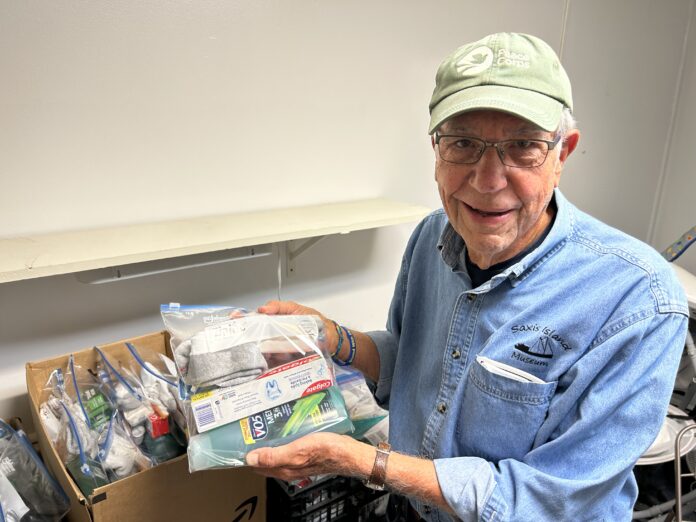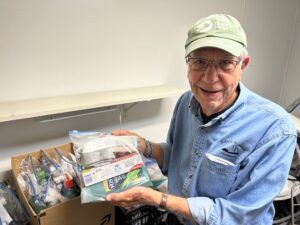
BY CLARA VAUGHN, Eastern Shore Post —
When work in tomato fields stopped in August, it left hundreds of migrant farmworkers on the Eastern Shore without wages for over a month.
Three packers at Lipman Family Farms spoke to the Eastern Shore Post about their experience on the condition they remain anonymous.
Despite the work stoppage and conditions that deter U.S. citizens from filling their jobs, they hope to return again next year.
“The salary here is bigger than in Mexico,” one woman said through a translator. “We have a better life for our families.”
“It was very difficult, because we didn’t receive any money,” another said of the work stoppage, which lasted five weeks.
Filling a gap
They are among more than 1,000 pickers, packers, and production workers who come to the Eastern Shore on the H2-A visa program each year, said Stacy Rhodes, of the Agricultural Workers Advocacy Coalition based on the Eastern Shore.
Their labor contributes about $10 million in revenue for the Shore each year, he estimated. Nationally, the agricultural sector relies heavily on migrant farmworkers to bring food to markets.
The visa program helps employers who anticipate a gap in domestic workers to bring in temporary foreign workers who fill seasonal agricultural jobs such as planting, cultivating, harvesting, and packing produce.
It prevents those workers from seeking other jobs, so when work on farms stops due to weather or other factors, pickers and packers have no way to earn income.
“Workers don’t have work, so they don’t have money not only to send back to their families, but to provide for themselves,” Rhodes said.
“This is a national problem,” he added.
The three women who spoke to the Post estimated they send around 80% of their wages home to their families in rural Mexico.
They have no trouble finding jobs at home, where they work in garment factories, but U.S. wages make the trip to Virginia worthwhile, they said.
“Even one day of work is one week of wages in Mexico,” said one of the packers, who reported earning $14.91 hourly packing tomatoes, before taxes and other deductions.
“When they applied, the person in the (visa) office said, ‘There is a lot of work there, so maybe you’ll come back with around $10,000,’” the translator said. “But the reality is when they come here, they’re not working every day.”
A work stoppage
When work halts on the farms, it creates what Rhodes called a “periodic food shortage” for migrant workers.
Groups like Dos Santos food pantry are working to fill the gap when the workers have no way to earn wages.
“This has been the worst year” for food shortages, said Dos Santos Director Betty Mariner.
The volunteer-run operation delivered 30 packets of food twice weekly to different groups at Lipman’s Ames Farm location during the work stoppage, she said.
One packet cost $13 and includes items such as rice, beans, oil, and pasta, as well as chicken donated by the Foodbank of the Eastern Shore, she said.
“What we give them probably won’t last a week, but it’s a help,” Mariner said.
When asked about migrant workers’ response to the work stoppage, she said they were mostly quiet.
“They don’t say much about it. There’s nothing they can do about it,” Mariner said.
Better work conditions
When asked what could make work on the H2-A visa better, the packers named being paid weekly, regardless of work.
“They would like the company to understand the situation,” the translator said. “For example, if there is no work for one month, provide some money each week.”
The women were not able to send any money home when work stopped for five weeks, she said.
The packers also said extending their contracts as the growing season extends in southern states such as Florida, or offering jobs with other companies, would help.
“The work is very hard, so we are here because we need the job,” one woman said.
Other factors that could make life better while they reside in the migrant camps include providing transportation to buy goods, make deposits, or visit medical centers, they said. The companies provide rides to Walmart once a week.
They also said a washer and dryer at the camp would help so they can wash and dry clothes when it rains.
“As anybody in business knows, it’s more efficient to have people return,” Mariner said. “And so the more they feel that they’re going to be supported, the more likely they’ll come back.”
A Lipman Family Farms representative did not respond to the Post’s request for comments.
Visit www.dossantosfoodpantry.org to learn more about Dos Santos or to donate to the food pantry. Those wishing to donate to agricultural workers or AWAC specifically can select this on the drop-down menu on the website.
— To learn more about volunteer opportunities, call Dos Santos at 757-710-4352 or visit the thrift shop at 25377 Lankford Highway, in Onley, Wednesday through Sunday from 10 a.m. to 5 p.m.
— 
Stacy Rhodes, of the Agricultural Workers Advocacy Coalition, holds a packet of toiletries and socks that Dos Santos thrift store and food pantry in Onley provides to migrant farm workers. More than 1,000 workers travel to the Eastern Shore each year to plant, cultivate, pick, and pack produce, he said.


